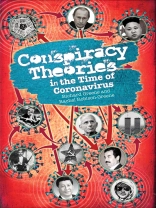Microchips, government-replaced bird drones, QAnon and vaccine tracers: these are just a few of the most common conspiracies we have heard over and over again throughout most of 2020-2021’s news cycles. There are common categories of conspiracy theories, variants of which pop up over and over again, and new and outrageous theories that seemingly appear overnight. While most of them are easily debunked, conspiracy theories and their root causes can be used to closely track people’s most significant philosophical concerns at a point in time. In this up-to-date study of conspiracy theories, the authors look at the history of conspiracy theories, discuss the history and hallmarks of such theories, and examine what counts as a conspiracy theory–and what doesn’t.
Daftar Isi
Part I
Understanding Conspiracy Theories 1
1. Conspiracy Theories Past and Present 3
2. Conspiracy and Theory 15
3. What Are Conspiracy Theories? 27
4. The Various Natures of Conspiracy Theories 39
5. The Epistemology of Conspiracy Theories 51
6. A Puzzle about Identity 67
Part II
Conspiracy Theories in the Modern World 79
7. Conspiracy Theories as Jokes 81
8. The Politics of Conspiracy Theories 91
9. Conspiracy Theories, Social Media, and the
Internet 103
10. Existential Matters and Categories of
Conspiracy 115
11. The Psychology of Conspiracy Theories 135
Part III
Conspiracy Theories and Values 151
12. The Ethics of Belief 153
13. Conspiracy Theories and Human Virtues 163
14. What’s at Stake When We Believe Conspiracy
Theories? 183
15. Conspiracy Theories as a Social Problem 195
References 209
Index 215
Tentang Penulis
Rachel Robison-Greene is an Assistant Professor of Philosophy at Utah State University. Her research interests include the nature of personhood and the self, animal minds and animal ethics, environmental ethics, and ethics and technology. She has edited many volumes in pop culture and philosophy, including The Handmaid’s Tale and Philosophy. She is the co-host of the pop culture and philosophy podcast I Think Therefore I Fan.












